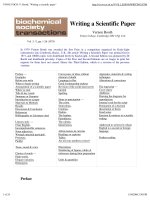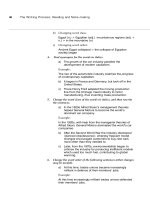writing a narrative
Bạn đang xem bản rút gọn của tài liệu. Xem và tải ngay bản đầy đủ của tài liệu tại đây (43.16 KB, 2 trang )
WRITING A NARRATIVE
I/ What is a narrative?
• Narrative present is a connected series of events, euther imaginari or based on
your own experience, in a vivid descriptive style
• A narrative may be writtien in the first person ( I / we) or third person ( he/ she/
etc), and often in cludes the thought, reation, etc of the main character(s),
describing the action as it would be seen through their eyes
II/ A narrative outline
1.Introduction ( Paragragh 1)
Set the scene ( who/ what / when / where )
• The beginning of a narratine story should usually give the readar a clear oicture
of what is happening, and may include description of
• Setting: place, time ( time of date/ year, historical period ), weather, etc.
• People: name, appearance, feelings, etc of the character(s) involved.
2.Main body ( Paragragh 2,3, ) develop the story.
(descripe incients thet lead up to the main event)
3.Conclusion (final paragragh) end the story ( complete the plot, describe feelings/
reatiions; explain the consequences)hậu quả
III/ Languange features
The use of tenses:
Narratives are normally set in the past, and therefore use a variety of past
tenses.
• Past continuous: is often to set the scene (e.g. the wind was howling )
• Past simple: is used for the main event (e.g. He entered the room, looked around,
and
• Past perfect: is used to describe an event before the main event(s)
e.g. she had set out
• The sequence of events important; therefore, you must use times words such as :
before, after, then.
In the beginning, later, in the end
Until, while, during, finally, etc
All of sudden
IV/ Good writing tips:
Vivid description is important when beginning story
• To describe setting, you may use details involving the tenses do suggest a
particular atmosphere
e.g. lapping waves, soft sand = peaceful scene
• When describing people/ action, you may use vivid description one emotion,
mannerisms, etc to suggest a particular mood.
e.g. stunned(Chan nan), she sat down shakily and buried her face in her hands (stunt=
shock, strike)
V/ Use descriptive vocabulary
• Avoid using simplistic adj or verbs (e.g. good, bad, nice, well, etc) as these
words will make your composition
• Use a variety of descriptive verbs (e.g. murmur, whisper, mutters instead of “
sad”) will make your story lively
Ex:
Uninteresting: “oh, don’t brother!” he sad, and went out of the room
More interesting: “oh, don’t brothers!” he growled, and rushed out of the room.
Uninteresting: Jack walked up to me and put out his hand
More interesting: Jack stroke up to me and thrust out of his hand









